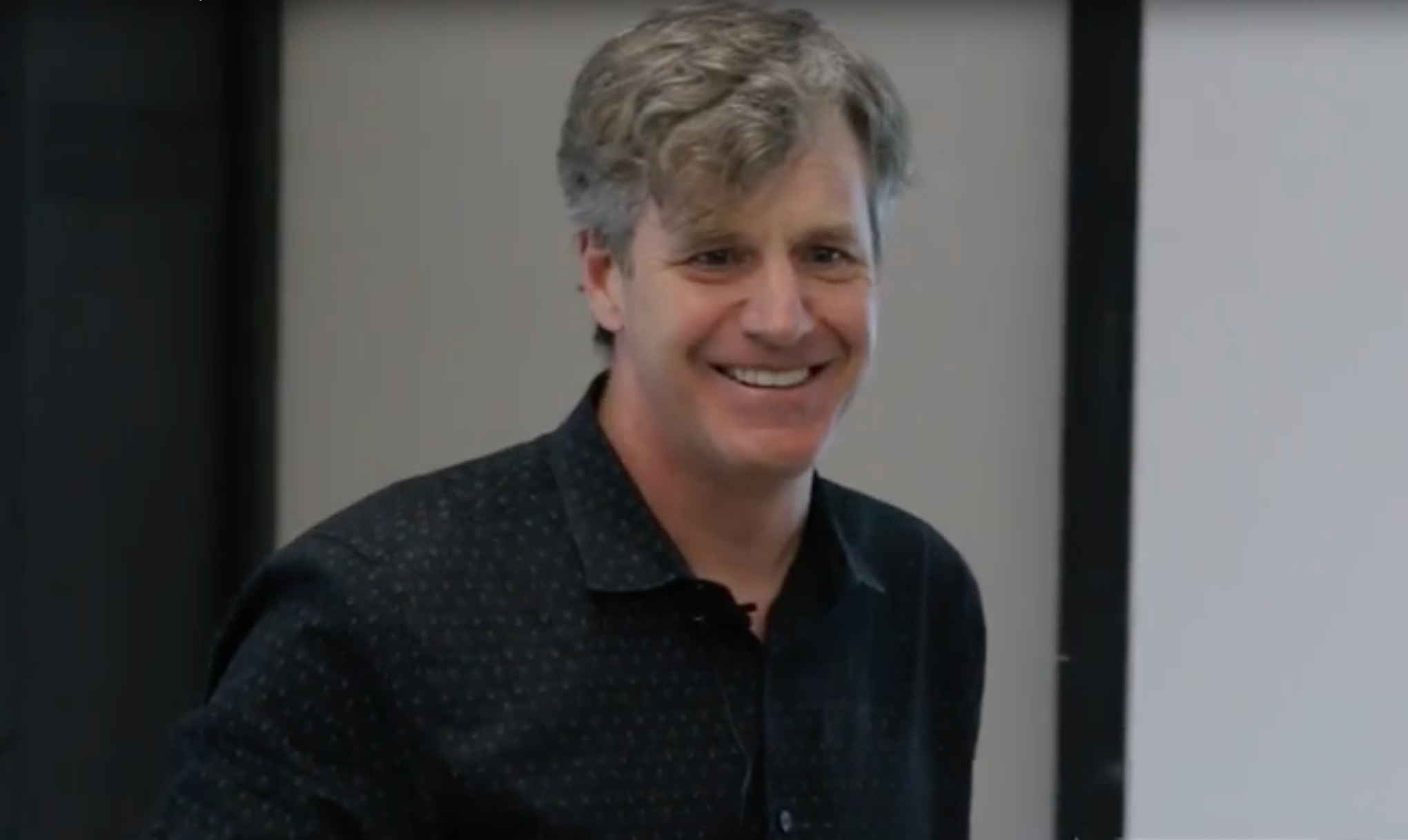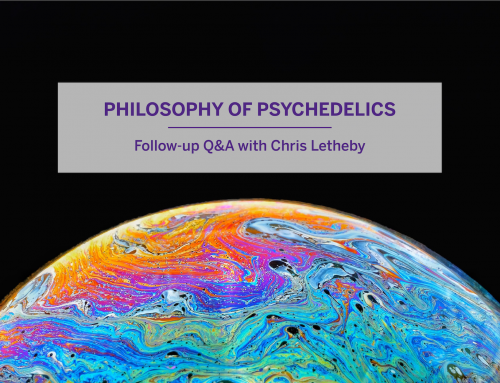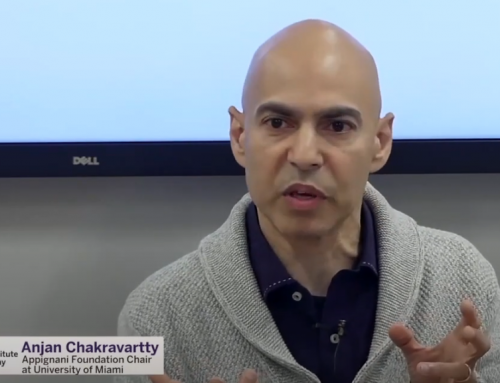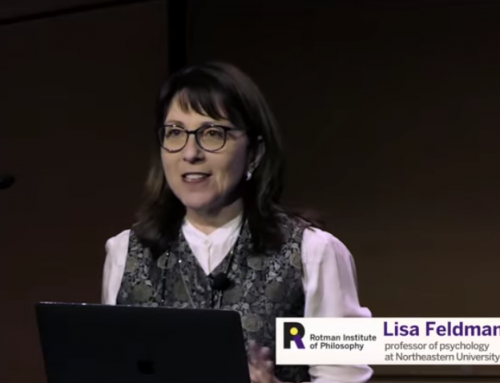Carl Craver is a philosopher of neuroscience with side interests in the history and philosophy of biology, general philosophy of science, metaphysics, and moral psychology. He is a professor in the Department of Philosophy and the Philosophy-Neuroscience-Psychology Program at Washington University in St. Louis. On March 31 and April 1, he delivered two lectures here at the Rotman Institute: Memory, Time and Agency and Ontic Basis of Network Explanation. During his visit, he sat down with Rotman graduate student Mary Stephensen, and philosophy graduate student Jody Tomchishen for the following interview.
Mary: Thank you so much for meeting with us today Professor Craver. While visiting Western you will be giving two talks, would you mind giving us a bit more information about each topic? Do you believe they are connected in any way?
Craver: The connection between the two is actually pretty weak. The one talk is mostly an outgrowth of my work on the philosophy of science, which is about the nature of scientific explanation. My talk today is about the rules of giving mechanistic explanations in network analysis. Network analysis has become increasingly popular in many areas of science, and (if I’m right) is a part of an overall mechanistic framework for thinking about what an explanation requires.
The work on memory is in some ways tangentially related. It is involved in a mechanistic explanatory project, but it is not so much driven by the question of what the conditions of success for a mechanistic explanation are or what is ultimately wanted out of a mechanistic explanation. Certainly, everything I was talking about in the memory talk yesterday was a kind of inference that one makes in reasoning about mechanisms: A dissociation inference. You can really only do those kinds of studies well if you are thinking very seriously about the norms for doing them well, and philosophers of science are interested in that kind of thing. The memory project started as a fortuitous outcome of an interaction with Endel Tulving, an opportunity I just simply could not bring myself to decline. In the end, it grew into something that was less of a hobby and more like half of my intellectual life.
Mary: What initially sparked your interest in philosophy of science (neuroscience specifically)?
Craver: I think this is an interesting question, and anything that I tell you will be a post hoc rationalization of the story, but I think it really started with Freud. I had an early fascination with Sigmund Freud and his theories of the mind, and I avidly read almost everything Freud wrote. I was fascinated especially by the early neuroscientific period in Freud’s career, in particular, before you get to the period where he starts talking about ‘Ids’, ‘Egos’, ‘Superegos’, and ‘Oedipal Complexes’. There was a period where Freud was engaged with people like Broca and Wernicke and was mapping out neuronal organization in things like crayfish. There was really this serious neuroscientist side to Freud that he kicked to the curb at some point, and went on to build a psychological theory that was in many ways independent of the neuroscience he had done. But in, I think it was 1895, Freud wrote a manuscript, which was posthumously published and titled the Project for a Scientific Psychology. In that he builds a neural network model of the brain and claims to have explained everything from dreams to slips of the tongue in terms of what he describes as three basic laws of neural function. Out of this comes what looks like a very early version of the entire Freudian system of the mind.
I thought it was fascinating that something so amorphous as neuron diagrams for him seem to entail the truth of many of his psychoanalytic hypotheses. I thought it was pretty clear that he had a bunch of psychoanalytic hypotheses and a neural model and that he was able to graft his psychological theory onto a neural model that placed no constraints on the psychological model whatsoever. I was so impressed with that fact that I wondered whether contemporary neuroscience was really any different: might we have a bunch of facts about neurons and a bunch of stories about psychology, and we simply think that these things are constraining one another. Is it possible that our ideas about the nature of the mind are in fact being read onto a neural structure that is underspecified to such an extent that it will support pretty much any psychological story that we want to tell? It was the suspicion that this might be the case that got me especially interested in neuroscience.
In the 1980’s there were a bunch of articles coming out about the ‘gay brain’ or the differences between male and female brains. I thought that these, to me, had a high probability of being cases in which our stereotypes were being foisted upon a brain structure where, if we looked long enough, we could find differences that would correspond to our stereotypes, that we were somehow etching social categories into the structure of the brain. I thought that somebody needed to ask the question: When does brain data really constrain our psychological theories? When are we reading our psychological theories onto a structure that will accommodate whatever psychological theory one has got? I think it was that initial comparison between Freud’s neurocognitive models and contemporary neurocognitive models that really got me started. Are we better off now than Freud was in 1895? And how do we know that? I think that was really what got me, what hooked me. I decided I had to learn some neuroscience, because I did not know any at that point. I thought I better go find out what people did, so I took a leave of absence from the history and philosophy of science program and signed up for a neuroscience program and started taking neuroscience classes. That was the only way I was going to learn enough to be able to address this question intelligently.
Mary: How has the work that you have done with Shayna Rosenbaum shaped your philosophical views, especially when it comes to scientific practice?
Craver: Shayna is an absolutely fantastic collaborator and has been very patient with me as I have tried to learn the ropes of neuropsychology. In the beginning, I had a bunch of questions that I think most philosophers who learn about episodic memory deficits would naturally have: about personal identity, decision making, moral responsibility, and, most generally, the role of memory in our lives as persons. I think Shayna was much more interested in questions that are more likely to strike a psychologist: how many kinds of memory systems are there? And how do those different memory systems work? And under what conditions do they fail to work? So, what Shayna has done for me, I think, is to help to turn inchoate abstract questions about the relationship between cognitive systems and persons into concrete tests that people with cognitive disabilities can perform. I was completely unaware of how difficult and sensitive the methodology is. If I had stumbled into these things on my own it would have been a disaster; I would have done really bad experiments. Shayna has years of experience working with this particular patient population and a deep knowledge of what you can and cannot do with them, and what you can and cannot conclude from various kinds of experimental findings. If I didn’t have her, I would have been dead in the water.
However, I do think it has been a bi-directional engagement, and I hope Shayna would see it that way too. There were questions I had by virtue of my philosophical training and my natural philosophical interests that were just very different from the ones that she was thinking about at the time. When we started to talk about it, it was clear that there was a huge set of research programs that could come out of a non-reductionist approach to the question: What does episodic memory do for us as people? What would a person’s life look life if it were stripped of this one cognitive capacity leaving everything else in tact? Can they make moral decisions? Plan their futures? Maintain a sense of identity over time? Intuitively, the answer is no. Empirically, the answer turns out to be yes. I think it has been a rather lovely collaboration where we came with different expertise and different interests, and it really has worked beautifully.
Mary: It appears that your views have evolved over time, what do you think are the most fundamental changes that have been made?
Craver: I see myself as very committed to a set of core ideas that you could etch on my tombstone right now. I believe, for example, that to explain a natural phenomenon is to situate it in the causal structure of the world. However, two things have changed since my early work. One is that I got more nuanced in my understanding of causation. There was a shift early on from a very metaphysical notion of causation that was showcased in that Machamer, Darden, and Craver paper, (which was really one of the first big mechanism papers) and moving in the direction of something that seemed to be more scientifically respectable and less metaphysically laden. This is a theory of causation that basically amounts to the claim that A causes B if and only if you can wiggle B by wiggling A in a well-controlled experiment. What I liked, first of all, was that this view had much more content then the metaphysical posits of the earlier mechanistic work. It provides an account of what it means to be explanatorily relevant. For me, this way of defining it also reflected the way that scientists actually test these claims. It is about intervening on something and changing its value and measuring the consequences of those changes under well-controlled conditions. Since it was a goal of mine to speak across these disciplinary boundaries, having a way to think about causation that fits with the way that scientists design experiments was, I think, a real advance.
Another way that I have changed from the very beginning is that it is not longer important to me to hide the fact that I’m a physicalist. Almost everyone is a physicalist, and I no longer feel any sociological pressure to step out from that pack. That does not mean I think there are no higher level causes or that there are no interesting research programs that look up rather than down. Nor does it mean that I think all questions are answered, ultimately, by physics (e.g., questions about math or ethics). It just means I think that all the stuff we are studying in psychology and neuroscience is ultimately grounded in the physical structure of the world. There are no special laws or forces of psychology that are not analyzable or explicable, in some sense, in terms of the stuff at the lowest levels. So, those are two changes I’ve noticed in myself. I also think just taking on this research project in experimental neuropsychology has been a strange turn in my career that I would not have anticipated, though I might have dreamed of some day getting the opportunity.
Jody: In your writings you promote a mechanistic account of explanation; we want to know what kind of a role idealization plays, given that your mechanistic account is a realistic account?
Craver: I think this is a really complicated issue, and my book really did not do anything to resolve it. For the most part, I just ignored the topic. Now, as you know, there is an ontic view of explanation. From that ontic perspective, a philosopher trying to answer the question “What is a scientific explanation” should try to specify the kinds of relations in the world that properly belong in explanations. We are not going to have spirits and goblins, we are not going to have mere correlations, and we are not going to have mere temporal sequences; we are looking for causes. That fundamental constraint tells us what are the proper things that ought to appear in our explanatory texts. I think it is a goal of science to try to understand the world as it in fact is.
That said, science would be utterly impossible without abstraction and idealization because the world is complex and because human cognition is limited in its ability to deal with that complexity. We would not even be able to focus on the right things if at times we did not idealize in our models to focus our attention on certain aspects of that ontic mechanism, and to downplay the importance of other aspects of that ontic mechanism. But I think when scientists do that, they aren’t claiming… well in many cases they are perfectly aware that their idealization is in fact an idealization. They are intentionally claiming something false about the system to make the math easier, to make it more intelligible, to make the model simpler, to really focus our attention elsewhere in the mechanism, and to make the key point there.
But consider this: For any given mechanism of even moderate complexity, scientists are not going to have one model to describe that thing. There are going to be a multitude of models that describe different aspects of it from different perspectives. Some of those models will idealize in one place and get very realistic in other places, and then the next model will place the idealizations elsewhere and really focus on this other thing. I think idealization is a tool we use to grapple with the complexity of the world. It would be impossible to understand any moderately complex mechanism without engaging in that kind of idealizing enterprise. But that does not mean that somehow science has given up the search for truth, or that it does not matter whether the theory is in fact true or false. What matters is whether the parts of the model that the scientist is really committed to being true are in fact true.
Think about the example we talked about in the discussion the other day: Hodgkin and Huxley treated the axon as if it were a perfect cylinder; we know it is not a perfect cylinder. As Michael Anderson pointed out, it makes a difference that it is not a perfect cylinder, but Hodgkin and Huxley were not concerned with those nuances. They wanted a model that would apply to all kinds of axons, and the shape of the axon wasn’t central to their concern. What was central was the change in conductance in the membrane. They were clearly trying to get right, and they were very meticulous about modelling the conductance changes across the membrane and fitting it to their voltage clamp data. For that purpose, they did not need to be committed about the exact structure of the axon, and in fact axons are so different from one another that attempting to describe them in all of their detail would mean that you would need a separate model for each individual axon. I see this as entirely consistent with the claim that they are trying to understand correctly (i.e., truly) how these mechanisms work, but they use idealization as a tool to get at that understanding.
Jody: I wonder if the next question is now redundant. Given your view about mechanistic accounts, it would seem there is a tension between mechanisms involving real entities and activities, and the presence of pragmatic considerations such as an experimenters’ interests.
Craver: I think this is a somewhat separate question. Pragmatics is relevant to idealization: what we care about and what we do not, and what we are trying to focus on and what we are not. Think about those old anatomy textbooks in which the first couple of pages would have an outline of a body along with translucent sheets that you could pull over that picture of the body. One sheet would be the circulatory system, and one would give you the respiratory system, and one the reproductive system. If you kept layering these things, at the end, you could put them all together and you could see how they were all overlaid on the same body. Each one is a different way of slicing the body into parts, focusing on different parts in that system, and I think pragmatics enters by choosing how we are going to carve up the organism. How we do so depends on whether we are a developmental biologist or a cognitive psychologist, on the one hand, and on what it is we want to explain on the other. If I am interested in explaining reproduction, then the body gets carved up in one way; some things come into the foreground and some things go into the background. If I am interested in describing the circulatory system, parts that are relevant in the reproductive system go into the background or are not relevant at all, whereas other parts come to the front. If I am a developmentalist, I won’t start by describing a fully functioning adult, and I will divide the parts historically in ways that might cross-cut the parts described by an anatomist focused on the mature adult (the retina, for example, might be chunked with the brain).
I think pragmatic considerations drive what questions we want to answer and, as a consequence, what parts are going to be relevant for answering those questions. Given the question we are interested in, we have to determine which parts are relevant to that. For example, how does blood circulate in the body or how do human beings manage to reproduce? There are perfectly factual answers to either question, but what parts are relevant? The fact that different parts come to the front, or different aspects of different parts come to the front, when we are asking different sorts of questions, is perfectly compatible with the idea that there are true answers to the question “What is relevant in each case?”
One other thing that I would add: if we are engineers (rather than basic scientists) we are not interested in how the brain does what it does under its own conditions. Rather, we are interested in how we can make the brain do the things that we want it to do to, to cure diseases, or to make minds better in some way; then we might even identify parts inside the brain or inside the body that are never of any use to the organism in its normal conditions. I would say that such parts are real and that there is a factual question about whether you could wiggle those parts and get the effects you want. So, in that sense, the causal structure is there, it is the kind of thing that we can investigate with experiments like anything else. But which aspects of that causal structure we bring to the foreground and which ones we put into the background depend on what exactly we are interested in explaining or doing.
Jody: I have a follow up then, in the engineer case, would they be trying to create mechanistic explanations, or are they merely using things, that aren’t really mapped onto how the world actually is?
Craver: Often it is both. If you look at the people who are doing brain machine interface, for example, they are not only interested in getting robotic arms to be driven by electrical interfaces with brains, but in some cases they are interested in learning how the brain learns to accommodate a robotic arm. So, they are both engaged in a practical project of trying to build something new and using the project of trying to build something new as tool to study how brains do the things that they do on their own. It is very difficult to try and separate these two endeavours. To some extent, I think the engineer is often permitted to not care at all about the underlying mechanisms. Not all engineers have to be interested in the “normal” biological mechanisms, but they all have to be interested in causal structures. The causal structures are the raw ingredients with which they can build.
Jody: What advice would you give to students of philosophy of neuroscience, what expertise should they cultivate, and how should they use their training to interact productively with scientists?
Craver: I think the answer here is to just do it. Go work in a lab. Start a reading group with scientists. You have got to earn their trust. I think that it is very difficult, as these are two different cultures. Two different ideas about what the interesting questions are and what constitutes knowledge. I think many scientists think of philosophy as a kind of fuzzy-headed enterprise, where you just sit around and push words around on a page. They do not recognize that philosophy is fundamentally about rigorous thinking. Science and philosophy have a common enemy in false thoughts and dogmatism.
We are all after clear thinking about the deepest problems. I think just getting into the trenches and working with them, talking about the things that we talk about, and learning enough about what they do, in order to talk to them intelligently about it and ask a reasonable questions. Earning their trust is really a key part of success in this. I think it is really exciting as part of your graduate training that you go sit in a lab and go to lab meetings. I would strongly encourage everyone to do more than that, like actually start doing experiments, because it is at that moment when you see what science is about. It is not going to come from listening to people talk about it. It is feeling the pain of doing science that really gets you the understanding of the machinery that makes it run.
Jody: Do you believe philosophy has enriched science, and if so how?
Craver: I do not recognize this distinction. Scientists need concepts and inference rules to reason, and philosophers cannot ignore data or do so only at their own peril. Was Newton a philosopher or scientist? It is called the Principles of Natural Philosophy after all. Was Darwin a philosopher or a scientist? Was Mach a philosopher or a scientist? Was Jacques Loeb a philosopher or a scientist? The best scientists think deeply about things, and the best philosophers will take any good argument wherever they can find it. In this sense, we are kind of on the same team in fighting ignorance and dogmatism. It is the pursuit of human knowledge that we are both engaged in; about not just the simple questions, but the hardest questions.






